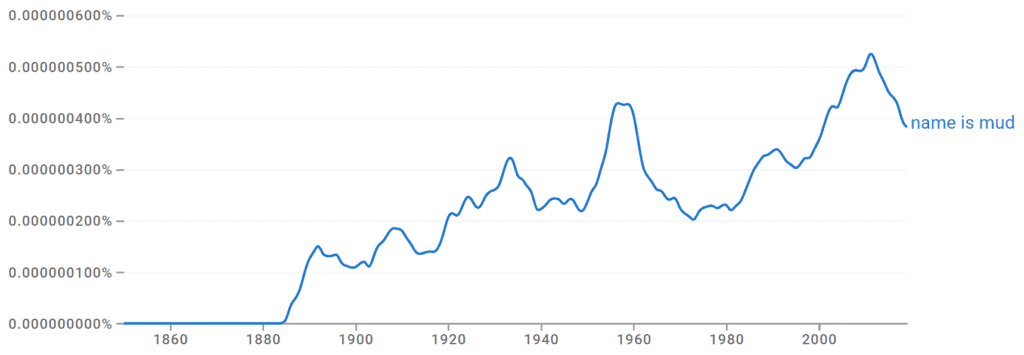The idiom my name is mud means that one’s reputation is tarnished or damaged. When someone says their “name is mud,” they’re expressing a loss of respect or trust from others. Take, for instance, an administrator caught embezzling school funds. After the incident, her name was mud in the district, forcing her to relocate for employment.
The use of mud to signify foolishness dates back to the 1700s, illustrating the idiom’s deep-rooted origin in the English language.
Idioms like this one are phrases that convey a figurative meaning, distinct from their literal interpretation. Mastering these idioms is pivotal in understanding the nuances of English.
Keep reading to learn more about its meaning, origins, and how to use it in modern examples.
My Name Is Mud Meaning

The idiom my name is mud signifies a damaged reputation, suggesting that someone is now viewed unfavorably or is involved in a scandal. It emphasizes a steep decline in one’s standing, hinting at disgrace or loss of trust in the community.
This expression has its roots in associating mud with something undesirable or tainted. Just as mud can stain clothing, a scandal or wrongdoing can tarnish a person’s reputation.
Throughout history, the concept of one’s name and its association with honor and integrity has been paramount; hence, the idiom underscores the weight of having one’s name besmirched.
One’s Name Is Mud Synonyms
- One’s reputation is tarnished
- One is disgraced
- One’s character is in question
- One’s name is sullied
- One is viewed unfavorably
- One’s credibility is undermined
- One’s image is marred
Using One’s Name is Mud in Sentences
- After the scandal broke, the CEO’s name was mud in the business community.
- The politician’s name became mud when evidence of corruption and bribery surfaced during the investigation.
- Once the truth about the journalist’s fabricated stories came to light, her name was mud in the journalism industry.
- The athlete’s name was mud among fans and teammates after being caught using performance-enhancing drugs.
Your Name Is Mud Origin

The phrase of calling someone mud as a name to infer they have been discredited dates back to a British book, “Slang: A Dictionary of the Turf,” written by John Badcock in 1823:
- Mud – a stupid twaddling fellow. ‘And his name is mud!’
This association of mud with foolishness can be tracked even earlier to the 1703 work “Hell Upon Earth” in the MEMOIRS Of the Right Villainous John Hall:
- Mud, a Fool, or Thick-skull Fellow.
A common misconception links the phrase’s origin to the aftermath of Lincoln’s assassination. John Wilkes Booth, after shooting Lincoln, injured his leg and sought treatment from Doctor Samuel Mudd. Though Mudd later faced accusations of being a co-conspirator, many believe he was wrongly implicated.
However, this tale isn’t the actual birthplace of the idiom your name is mud. The phrase existed long before this incident, and Dr. Mudd’s involvement is merely an intriguing historical coincidence, not the term’s genesis.
Let’s Review
The idiom one’s name is mud conveys the idea that an individual’s reputation is tarnished, implying they’re perceived poorly because of their actions or conduct.
While some attribute its origin to events after President Lincoln’s assassination, this is a misconception. In reality, the expression’s roots stretch to the early 18th century. Historical documents showcase the term mud as a label for someone seen as lacking honor or trustworthiness.
